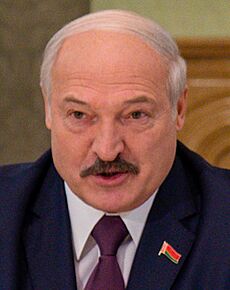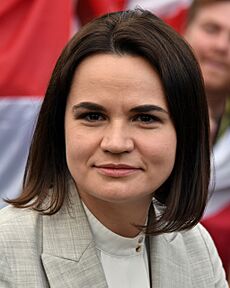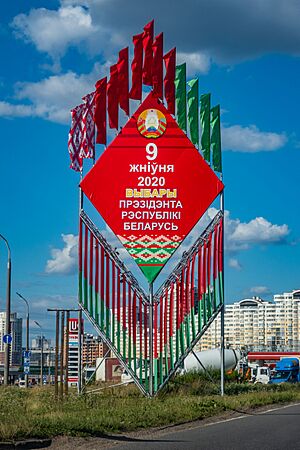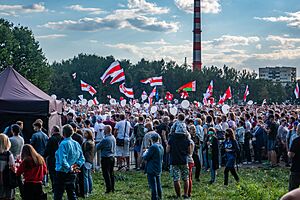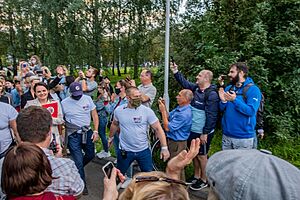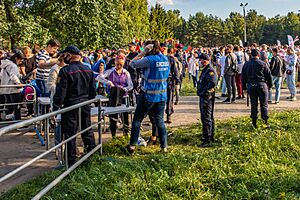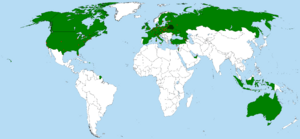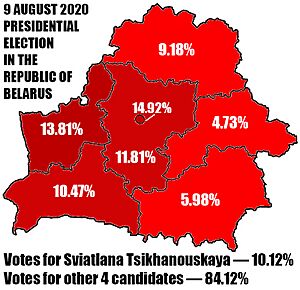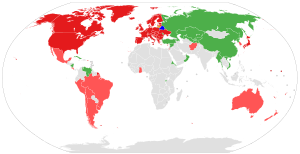2020 Belarusian presidential election facts for kids
Quick facts for kids |
||||||||||||||||||||
|
||||||||||||||||||||
| Turnout | 84.28% | |||||||||||||||||||
|---|---|---|---|---|---|---|---|---|---|---|---|---|---|---|---|---|---|---|---|---|
|
||||||||||||||||||||
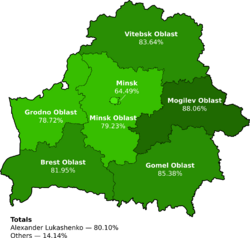
Official results by region
|
||||||||||||||||||||
|
||||||||||||||||||||
A presidential election was held in Belarus on Sunday, August 9, 2020. People could vote early from August 4 to August 8.
The country's election committee announced that Alexander Lukashenko, who was already president, had won his sixth term. They said he received just over 80% of the votes. Lukashenko has been president since 1994. Many international groups have said that most elections in Belarus since 1994 were not fair or free.
The main opposition candidate, Sviatlana Tsikhanouskaya, said she had won the election with at least 60% of the votes. She asked Lukashenko to talk about a peaceful transfer of power. Her team then created a group called the Coordination Council to help with this change. They also said they were ready to organize "long-term protests" against the official results. Later, all seven main members of this council were arrested or had to leave the country.
All opposition candidates asked the election committee to cancel the results, saying there was widespread electoral fraud. Many countries, including the European Union, did not accept the election results. The European Union also placed restrictions on Belarusian officials who they believed were responsible for "violence, repression, and election fraud." These election results led to many large protests across Belarus.
Contents
Understanding the Election
On May 8, 2020, the National Assembly decided that the presidential election would be held on August 9.
Alexander Lukashenko had been the leader of Belarus since the first presidential election in 1994. Over the next two years, he gained a lot of power. In 1995, he won a vote that allowed him to close down the parliament if he felt it went against the country's rules. In 1996, he won another vote that greatly increased his power and extended his term until 2001. Since then, many people in Western countries have described his government as an authoritarian system. This means one leader has a lot of power and controls many parts of the government and society. People who speak out against the government are often pressured or arrested. By 2020, Lukashenko or those loyal to him controlled all seats in the parliament, all judge appointments, the media, and the election committee. This committee has the power to approve or reject people who want to run for political jobs.
How the Election Works
The president of Belarus is chosen using a system called the two-round system. This means if no candidate gets more than 50% of the votes in the first round, a second round is held. In the second round, only the top two candidates from the first round compete. The person who wins the second round becomes president. Also, at least 50% of people eligible to vote must participate for the election to be valid.
Even though this two-round system is in place, a second round has not been officially needed since 1994. In the four elections before 2020, Lukashenko was said to have won with 77% or more of the votes in the first round. No election in Belarus since 1994 has been seen as fair and open by international groups.
Who Ran for President?
To become a candidate, people needed to meet certain rules. One main rule was to collect at least 100,000 signatures from citizens who supported them. They also needed to create a group of at least 100 people to help gather these signatures.
Approved Candidates
Here are the candidates who were officially allowed to run by the election committee on July 21, 2020:
| Candidate | Main Job | Group Size |
|---|---|---|
| Alexander Lukashenko | Current president of Belarus | 11,480 |
| Siarhei Cherachen | Leader of the Belarusian Social Democratic Assembly | 1,127 |
| Hanna Kanapatskaya | Former Member of Parliament | 1,314 |
| Andrey Dmitriyeu | Co-leader of "Tell the Truth" political group | 2,399 |
| Sviatlana Tsikhanouskaya | Human rights activist and politician | 247 |
Candidates Not Allowed to Run
Several people were not allowed to register as candidates:
- Viktar Babaryka – a former bank chairman. On July 14, the election committee decided not to register him. They said there were problems with his income and property declaration.
- Valery Tsepkalo – a founder of a technology park. On June 30, the election committee said he had only collected 75,249 valid signatures, which was less than the 100,000 needed. On July 24, Tsepkalo left for Russia with his children because he was worried about being arrested.
- Sergei Tikhanovsky – a popular YouTube blogger. He was arrested shortly after saying he wanted to run. He was released on June 21, 2025, along with 13 other political prisoners.
Collecting Signatures
To become a candidate, people needed to gather at least 100,000 signatures. Here's how many signatures some candidates collected:
| Candidate | Signatures Submitted | Signatures Accepted |
|---|---|---|
| Viktar Babaryka | 367,179 | 165,744 |
| Siarhei Cherachen | 149,750 | 143,109 |
| Andrei Dmitriyeu | 110,754 | 106,841 |
| Anna Kanapatskaya | 151,631 | 146,588 |
| Alexander Lukashenko | 1,958,800 | 1,939,572 |
| Valery Tsepkalo | 158,682 | 75,249 |
| Sviatlana Tsikhanouskaya | 109,479 | 104,757 |
Some reports suggested that government organizations encouraged their employees to sign for Alexander Lukashenko, sometimes with threats about their jobs.
Key Moments Before the Election
May 2020
- May 15: This was the last day to register as a candidate. A record 55 people applied.
- May 29: Blogger Siarhei Tsikhanouski and nine of his team members were arrested at a public event in Hrodno.
June 2020
- June 11: A criminal case was opened against some employees of a bank led by Viktar Babaryka. Searches were carried out, and 15 people were arrested.
- June 18: Viktar Babaryka and his son Eduard were arrested. That evening, thousands of people in Minsk formed a human chain to show support.
- June 30: The election committee rejected five presidential candidates, including Tsepkalo, who did not have enough valid signatures.
July 2020
- July 14: The election committee refused to register Babaryka. This led to protests in many cities, and over 250 people were arrested.
- July 16: The teams of Sviatlana Tsikhanouskaya, Babaryka, and Tsepkalo decided to work together. They said they needed to watch the voting process closely and hold new elections if they won.
- July 19: The first large meetings with voters for Tsikhanouskaya were held in Vitebsk and Minsk, with thousands of people attending.
- July 30: A large rally for Sviatlana Tsikhanouskaya took place in Minsk. Human rights groups estimated 63,000–70,000 people attended.
August 2020
- August 2: Tsikhanouskaya's team visited Baranovichy and Brest, drawing large crowds. Planned events in other cities were canceled because the only available venues were booked by Lukashenko's supporters.
- August 4: Meetings with Tsikhanouskaya in Slutsk and Salihorsk were canceled at the last minute due to "urgent repairs" at the venues. Police were sent to these cities and arrested some people.
- August 6: A planned meeting for Tsikhanouskaya in Minsk was canceled because all available public spaces were booked for other events. Two DJs who played a song called "Changes" in support of Tsikhanouskaya were arrested.
- August 7: Tsikhanouskaya spoke to the Belarusian people with her allies Maria Kolesnikova and Veronika Tsepkalo.
- August 8: The election committee announced that 32.24% of people had voted early. Maria Moroz, Tsikhanouskaya's campaign manager, was arrested. Maria Kolesnikova was also briefly detained.
Campaign Activities
Siarhei Tsikhanouski and Sviatlana Tsikhanouskaya
In May 2020, Belarusian blogger Syarhei Tsikhanouski announced on his YouTube channel that he wanted to run for president. He was arrested shortly after. His trips around Belarus, where he talked about human rights issues and economic problems, were very popular. During these trips, he and his team were often followed by people believed to be from Belarusian special services.
After Tsikhanouski's arrest, his supporters held protests across Belarus. Many people were arrested during these protests. The election committee refused to register his group to nominate him as a candidate.
Because of this, his wife, Sviatlana Tsikhanouskaya, decided to apply to run for president instead. Her group was successfully registered. Tsikhanouski then became the head of her campaign team.
After his release from temporary detention, Tsikhanouski traveled around the country to gather signatures for his wife. His events were very popular, attracting thousands of people. He said he was collecting signatures for a fair election in Belarus.
Tsikhanouski's campaign used the slogan "Stop the cockroach!" which his supporters chanted. The symbol of the campaign was a slipper. This slogan referred to a children's story about a "mustached cockroach" who scared all the animals and became their ruler. Many believed this was a reference to Alexander Lukashenko. Slippers are often used to get rid of pests. Some journalists called the events in Belarus the "Slipper Revolution."
On May 29, Tsikhanouski was in Hrodna collecting signatures for his wife. During this time, a police officer fell to the ground, and Tsikhanouski was arrested by special police units. His supporters tried to stop the police vans from leaving. State TV later showed a story saying the event turned into a fight and that police were attacked. Human rights groups reported that at least 13 people were arrested.
Tsikhanouskaya made a statement saying the arrest of her husband was a "dirty" trick and a violation of her rights as a candidate. She promised to complain to the election committee and the police.
The first two large rallies for Tsikhanouskaya's campaign after her registration were held on July 19. She was joined on stage by Maryja Kalesnikava, who managed Babaryka's campaign, and Veranika Tsepkalo, Valery Tsepkalo's wife. They had announced earlier that their campaigns would join forces.
Local governments canceled several of Tsikhanouskaya's planned campaign events before the election.
Alexander Lukashenko's Campaign
Alexander Lukashenko's campaign focused on his leadership during challenging times. His team used public meetings and media to present global and local issues as crises, which he would then solve. This approach aimed to show him as a strong leader. Later, his campaign focused on showing his power and control, including a speech to officials where he showed violent global scenes.
"Female Solidarity"
Before the 2020 election, Alexander Lukashenko had said that Belarus was not ready for a woman president. However, on July 17, 2020, the three women representing the main opposition candidates – Sviatlana Tsikhanouskaya, Valery Tsepkalo's wife Veronika, and Viktar Babaryka's campaign manager Maryja Kalesnikava – joined their campaigns. They called their alliance "Female Solidarity" to challenge Lukashenko.
Pressure from Authorities
Viktar Babaryka was arrested on June 18. He was held in a detention center in Minsk.
Valery Tsepkalo, who was not allowed to register as a candidate, went to Moscow with his children because he feared for his safety. He said friends in law enforcement warned him that he might be arrested. His wife, Veronika Tsepkalo, stayed in Belarus to help Sviatlana Tsikhanouskaya's campaign.
In June, Sviatlana Tsikhanouskaya shared a video saying she had been threatened with arrest and that her children might be taken away if she continued her campaign. She sent her children abroad to live with their grandmother for their safety. It had happened before that children of opposition candidates were taken away and placed in state orphanages.
According to Belarusian law, local authorities must set aside outdoor places for rallies and meetings. In Minsk, authorities allowed six such places, none in the city center. In smaller towns, usually only one place was allowed. During the 2020 election, authorities and Lukashenko's supporters often booked these places to prevent independent candidates from meeting with people. For example, in Pinsk, the only meeting site was booked by a Lukashenko supporter for many days, preventing Tsikhanouskaya from visiting.
On August 4, Tsikhanouskaya planned to visit Slutsk and Salihorsk. However, local authorities canceled these meetings at the last minute, claiming "urgent repairs" were needed at the venues. They did not offer alternative locations. People who gathered in these cities were asked to leave, and some who refused were arrested.
On August 6, Tsikhanouskaya had to cancel a rally in Minsk because all six allowed sites in the city were fully booked. She, Veranika Tsepkalo, and Maryja Kalesnikava visited one of the booked sites, but police did not let them in. During the event, DJs played a song called "Changes" to support Tsikhanouskaya. They were later arrested and sentenced to 10 days in jail.
On August 8, Maryja Maroz (Tsikhanouskaya's campaign manager) and Maryja Kalesnikava were arrested, though Kalesnikava was released a few hours later.
Showing Solidarity
People around the world held demonstrations to show support for the Belarusian opposition. These events took place in more than 20 countries and over 30 cities.
Public Opinion Surveys
In Belarus, only government-licensed groups are allowed to conduct public opinion surveys. Media outlets are also not allowed to conduct online polls about the election.
A survey in March–April 2020 by a state-affiliated group found that only 24% of people in Minsk trusted Lukashenko. Another survey by a state-affiliated center claimed that Lukashenko had the support of 72.3% of citizens.
How the Election Was Run
The Organization for Security and Co-operation in Europe (OSCE) did not monitor the 2020 election because they were not invited in time. The OSCE had not recognized any elections in Belarus as free and fair since 1995. Only observers from Russia and Azerbaijan were present during the election. On August 4, the first day of early voting, the election committee reported that almost 5% of people had voted. However, independent observers said this number was too high.
At some voting places, curtains were removed from voting booths, leaving them open on three sides.
Before the election, many journalists and bloggers were arrested or not allowed to cover the elections. More than 100 arrests had been made since January. Many believed the government wanted to reduce outside observation of the election.
"Honest People," an independent group that watches elections in Belarus, reported finding 5,096 violations from observers. They also questioned the election committee's reported voter turnout numbers. The group said that about 70 election observers were arrested.
Election Results
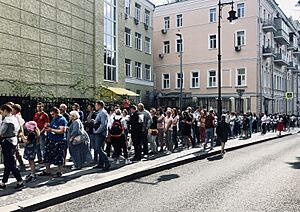
The election committee reported that voter turnout was 4.98% on August 4, and increased each day, reaching 32.24% by August 7. On August 9, the main election day, turnout was reported to be 84.05% by 8:00 PM. This was more than the 50% needed for the election to be valid.
According to The New York Times, the election result was "never in any real doubt" and seemed "foregone." They stated that Lukashenko "controls vote counting, [and used] a vast security apparatus and a noisy state media machine" that supported him. Sviatlana Tsikhanouskaya, the main challenger, reportedly went into hiding in Minsk after security agents arrested at least eight members of her campaign staff on election day.
| Candidate | Party | Votes | % | |
|---|---|---|---|---|
| Alexander Lukashenko | Independent | 4,661,075 | 81.04 | |
| Sviatlana Tsikhanouskaya | Independent | 588,619 | 10.23 | |
| Hanna Kanapatskaya | Independent | 97,489 | 1.69 | |
| Andrey Dmitriyeu | Independent | 70,671 | 1.23 | |
| Siarhei Cherachen | Belarusian Social Democratic Assembly | 66,613 | 1.16 | |
| Against all | 267,363 | 4.65 | ||
| Total | 5,751,830 | 100.00 | ||
| Valid votes | 5,751,830 | 98.85 | ||
| Invalid/blank votes | 67,125 | 1.15 | ||
| Total votes | 5,818,955 | 100.00 | ||
| Registered voters/turnout | 6,904,649 | 84.28 | ||
| Source: Central Election Commission | ||||
Polling Station Reports
After votes are counted, polling stations in Belarus create a "Protocol" (report) that summarizes the election numbers. This report is then displayed for people to see.
Many people took photos of these reports. These photos showed that in many stations in Minsk and in foreign consulates, the support for Tsikhanouskaya was similar to or even much higher than for Lukashenko.
A Belarusian political expert, Valer Karbalevich, said that the local reports and the final official results did not match at all.
Although Belarusian law requires these reports to be displayed at every voting station, some stations reportedly did not make them public. The Central Election Commission said they did not know about this and that there were no specific rules for how these local reports should be announced. When people complained, the Committee said they could not publish the reports again because they had only been sent to regional committees, which had closed after the final results were announced.
Voting papers are supposed to be kept for six months. However, a human rights activist in Brest found a large bundle of partly burned voting papers a few days after the election. He believed they were meant to be burned.
Online Initiatives for Vote Counting
"Voice" Platform
| Candidate | Votes submitted | with photo | % |
|---|---|---|---|
| Sviatlana Tsikhanouskaya | 1 003 717 | 536 546 | 95.65% |
| Alexander Lukashenko | 10 100 | 658 | 0.96% |
| Andrey Dmitriyeu | 6 778 | 2 047 | 0.64% |
| Siarhei Cherachen | 3 724 | 1 201 | 0.35% |
| Hanna Kanapatskaya | 2 491 | 688 | 0.23% |
| Against all candidates | 18 137 | 4 357 | 1.72% |
| Planned to not attend to cast vote | 2 685 | - | 0.25% |
| Planned to spoil ballot | 1 712 | 450 | 0.16% |
| TOTAL | 1 049 334 | 545 947 | 100% |
The Voice (Golos) project asked Belarusian citizens to send in photos of both sides of their voting papers, along with their voting location. The goal was to create a public collection of these photos to compare them with the official results.
By August 15, 2020, Voice reported that they had received 1,248,714 valid voting papers, which was about 18% of all eligible voters. By August 28, 2020, Voice updated its count to 1,049,334 unique confirmed votes, with 545,947 verified ballot photos.
Comparing Reports and Official Data
| Polling stations | Votes for Lukashenko | Votes for Tsikhanouskaya | ||
|---|---|---|---|---|
| with official data | where Lukashenko led | 1115 | 66.6% | 20.4% |
| where Tsikhanouskaya led | 195 | 31.3% | 56.7% | |
| total | 1310 | 61.7% | 25.4% | |
| without official data | 4457 | 88.5%† | 2.97%† | |
| † what would be required for consistency with the CEC results | ||||
On August 21, 2020, a final report by Voice, working with other platforms, looked at polling station results. For 1,310 out of 5,767 polling stations, they had photos of the official reports.
The Voice report said that if both the official results and the photos were correct, then in the polling stations where comparison was not possible (4,457 out of 5,847), Tsikhanouskaya would have had to receive only about 3% support. However, at the stations where data was published, she received 25% of the votes overall, with 57% in areas where she led and 20% in areas where she trailed. Voice called these differences "extreme anomalies."
What Happened After the Election?
After state TV announced exit poll results showing Lukashenko winning by a lot, protests and clashes between protesters and police broke out in Minsk. There were reports of injuries and the use of stun grenades and rubber bullets.
Sviatlana Tsikhanouskaya said she did not trust the exit poll results. She stated, "I believe my eyes, and I see that the majority is with us."
As voting ended, many internet services stopped working, and communication was difficult as police and military closed off most of Minsk.
On the second night after the disputed results were announced, protesters built barriers around the Rīga market. Security forces responded by using tear gas and flashbangs.
After being held for seven hours on election night, Sviatlana Tsikhanouskaya was taken by Belarusian security services to Lithuania. This was reportedly part of a deal to free her campaign manager, Maria Moroz.
On August 11, Tsikhanouskaya released a video where she seemed to be reading from a script. In the video, which was shown on state media, she asked the people of Belarus to stop protesting and accept Lukashenko's victory. Her allies believed the video was made under pressure, comparing it to a hostage video. She had sent her children abroad for their safety before the elections. On August 14, Tsikhanouskaya, now in Lithuania, released another video. In this one, she said she had won the election with 60 to 70% of the vote, which would have been enough to win outright. She called for a transitional council of "civil society activists, respected Belarusians and professionals" to manage the transfer of power from Lukashenko. She also asked her supporters to sign an online petition for a vote recount.
Arrests and violence against protesters, including claims of torture, increased in the week after the election. This led to calls for international restrictions against those responsible. On August 14, 2020, the Belarus Solidarity Foundation (BYSOL) was created. Its main goals are to support local groups, help people move to safety, support families of political prisoners, and help those who lost their jobs for political reasons. In 2020, BYSOL raised €2.9 million to help these groups.
On August 19, the Belarusian Central Election Committee said that Mr. Lukashenko would officially start his new term as president within the next two months.
On November 16, 2020, the BBC reported that more than 1,000 people were arrested during protests in Belarus over the disputed election. Police used rubber bullets and tear gas to break up the crowds.
Deaths Related to the Election
Konstantin Shishmakov, a 29-year-old museum director, disappeared on August 15. He had refused to sign the election commission's report. He called his wife around 5 PM and said, "I will not work here anymore; I am going home." He was later found dead.
Global Reactions
Countries and organizations around the world shared their opinions, with some accepting and some rejecting the election results. Many also commented on the protests, with more condemning the violence.
Countries and organizations that decided to place restrictions:
 Josep Borrell, a top official for foreign affairs in the EU, announced on August 14 that the EU would place restrictions on Belarusian officials responsible for "violence and falsification." Charles Michel, the leader of the European Council, said on August 19 that the EU would soon place restrictions on "a substantial number" of people responsible for violence, repression, and election fraud. The European Commission also said it would redirect 53 million euros (about £48 million) meant for Belarus away from the government and towards civil society groups.
Josep Borrell, a top official for foreign affairs in the EU, announced on August 14 that the EU would place restrictions on Belarusian officials responsible for "violence and falsification." Charles Michel, the leader of the European Council, said on August 19 that the EU would soon place restrictions on "a substantial number" of people responsible for violence, repression, and election fraud. The European Commission also said it would redirect 53 million euros (about £48 million) meant for Belarus away from the government and towards civil society groups. On August 18, 2020, the Lithuanian parliament agreed to place economic restrictions against the Belarusian government.
On August 18, 2020, the Lithuanian parliament agreed to place economic restrictions against the Belarusian government. On August 19, 2020, the Prime Minister of Slovakia stated that the Government of Slovakia had introduced restrictions against the Belarusian government.
On August 19, 2020, the Prime Minister of Slovakia stated that the Government of Slovakia had introduced restrictions against the Belarusian government.
See also
 In Spanish: Elecciones presidenciales de Bielorrusia de 2020 para niños
In Spanish: Elecciones presidenciales de Bielorrusia de 2020 para niños
- President of Belarus
- 2020–2021 Belarusian protests
- Coordination Council (Belarus)
 | Georgia Louise Harris Brown |
 | Julian Abele |
 | Norma Merrick Sklarek |
 | William Sidney Pittman |


